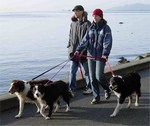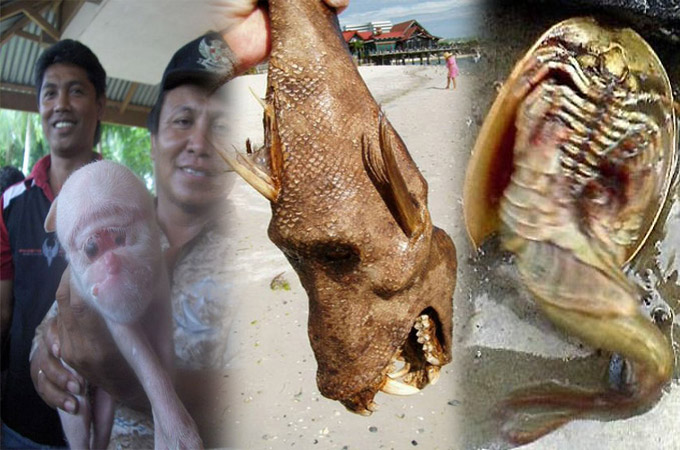 Animal studies and accounts of their emotional reactions to the suffering and death of those close to them indicate that they not only have empathy, they are capable of so-called remote sensing because they are cognitively linked with what I have termed the empathosphere. This discovery raises a profound ethical question; namely, when, for example, whales are being harpooned, chained elephants starved and beaten into submission, and billions of farmed animals made to suffer in extreme conditions of overcrowding, do other animals distant from them, but connected through the quantum field of the empathosphere, also experience their pain and anguish, and so fear us and cower or flee if they can?
Animal studies and accounts of their emotional reactions to the suffering and death of those close to them indicate that they not only have empathy, they are capable of so-called remote sensing because they are cognitively linked with what I have termed the empathosphere. This discovery raises a profound ethical question; namely, when, for example, whales are being harpooned, chained elephants starved and beaten into submission, and billions of farmed animals made to suffer in extreme conditions of overcrowding, do other animals distant from them, but connected through the quantum field of the empathosphere, also experience their pain and anguish, and so fear us and cower or flee if they can?
I have worked most of my professional life as a veterinarian and animal behaviorist/ ethologist seeking to improve the well-being of animals, wild and domestic.
There is much opposition from many quarters to the abandonment of cruel forms of animal exploitation; to examining the ends for which animals are used as a means; to extending the Golden Rule to all sentient beings; and to acknowledging the moral, spiritual and environmental consequences of institutionalized forms of animal exploitation and suffering, especially farmed animals raised in crowded, poisonous, disease spreading and highly polluting ‘factory’ sheds and feed-lots.
This opposition is not purely one of financial or other vested self-interest. It is one of a gross indifference that can rationalize animal cruelties and animal suffering because feeling for animals is either denied or repressed. Such a lack of empathy and compassion is as much a product of nature as it is of nurture; of how we our raised, influenced by cultural values and attitudes, and how we chose to respond to another’s plight that we may or may not have caused.
As philosopher Arthur Schopenhauer wrote, “There is only one untruthful creature on earth, and that is man. All others are honest and upright in that they openly declare their nature and do not simulate emotions they do not have.â€
Having feeling for others, including other animals, is part of our moral and empathetic development as compassionate and responsible members of society. In this regard I think that it is more appropriate to speak of animal suffrage, rather than animal welfare or animal rights. The nascent Animal Suffrage movement is one that recognizes that social change, moral progress, and especially the improvement in the treatment of animals, will never come through reason alone, but through a combination of sound science—facts—and genuine feeling, concern and commitment.
The term ‘suffrage’ comes from the Old French, meaning to pray or plead for another’s well-being. It is a term aptly suited to the groundswell of public concern over the plight of animals, domestic and wild, and the respective quality of their environments. Suffrage implies suffering with and suffering for, and it is only through such suffering that humanity will ever put an end to inhumanity in all its forms and situations.
Now this opposition of organized animal –based industries and businesses has embraced the term ‘animal welfare,’ and have animal welfare codes, ‘scientific’ standards etc that do little if anything to change the status quo of animal use and abuse.
Animal welfare is a patronizing term anyway. The opposition equates animal rights, which is a subject of moral philosophy, with radical extremism that fosters terrorism and threatens national (economic) security. They may well equate the Animal Suffrage Movement (ASM) with the Victorian Women’s Suffrage Movement, and wrongly conclude that ASM seeks to give animals the right to vote too. Such a ridiculous interpretation of the intent of the ASM may well be used to discredit the movement, just as the animal rights (more correctly the animal liberation) movement was demonized by religious fundamentalists and by the supporters of man’s unconditional dominion over all Earthly creation.
The animal rights movement has regrettably polarized and divided those who put people before animals and others who put all animals on an equal footing in terms of their being treated humanely and with respect. Many people are caught between these two points of view, the ‘undecided’ being the uncommitted. But they care when they are informed, and they suffer because they care. Intellectual debates over the rights of humans versus those of other life forms are at best a distraction, and at worse a turn-off for those who follow the wisdom of the heart and naturally embrace the concept of animal suffrage, and suffrage for all life.
The essential difference between the humane and the inhumane is the capacity to empathize—to feel for others. The awakening and nurturance of such fellow-feeling in children is a vital responsibility of parents and teachers. To suffer for others is to be human, without which love is just another four letter word. Empathy for animals leads naturally to a sense of moral indignation over the injustices of animal mistreatment and their marginalized legal standing in most cultures; and it is the lightning rod that ignites animal suffrage and compassion in action.
The Animal Suffrage Movement is not caught up in polemical debate over animal versus human rights and interests, or other animal’s degrees of sentience and sapience, but rather, is based on sound science and common sense with regard to determining and providing for animal’s well-being. It is a movement inspired by the heart of compassion that makes no distinctions between species, races, breeds, ages and sexes. It is both secular and spiritual, ecumenical and pan-entheistic.* Animal liberation and human liberation are synonymous and co-dependent. When we harm the Earth, we harm ourselves; and when we demean and exploit other animals, we do no less to ourselves.
From the perspective of compassion and reverential respect for all life, no parent or teacher would allow any child to go to a circus to. to have a ‘fun- filled, family bonding experience’ while witnessing the entertainment industry enslavement and exploitation of elephants, tigers and other wild animals, not domesticated so as to be able to cope somewhat with the terror of being surrounded by a crowd of noisy people in a brightly illuminated circus ring. The same can be said for seeing captive dolphins, whales and other ocean-roaming mammals doing tricks in Marina parks and aquariums. And no responsible parent or mature adult would ever wear the fur or skin of a trapped or captive-raised wild animal.
All should think twice about consuming any part of an animal he or she had not k***ed, and there were no alternatives, in order to survive and live simply and sustainably. Indeed our appetite for meat and dairy products, according to the current British Government’s Environmental minister, Ben Bradshaw, (backed by and excellent report from the U.N. **) contributes more to climate change/global warming, than any other human activity and commercial enterprise. In letting others raise and k***animals for our own consumption, our abdication of responsibility for each and every animal has resulted in a global, market-driven suffering of animals of inconceivable magnitude; and frequent massive meat and dairy product recalls of bacterial and other public health risks.
So we are called upon to make ethically enlightened dietary choices of political, economic, and personal health consequence. These include vegetarianism, (that may include eggs and dairy products from organically and humanely raised animals, but no meat or fish from animals k***ed for human consumption); veganism, (eating only plant-sourced nutrients); and what I call ‘conscientious omnivorism’ (for our cats and dogs too!), that includes some sources of animal protein in the diet from animals raised organically, ecologically, and treated humanely. These are all viable options under the broad and all inclusive embrace of Animal Suffrage, where our enlightened choices help reduce the burden of suffering on the animals, the destruction of the natural environment that we all share, and in the process help heal ourselves in body, mind, and spirit.




















Connect yourself with Chill Out Point to get daily updates!
SUBSCRIBE to Chill Out Point's News Feed to receive our fun articles as soon as we publish them. Don't forget to join our online communities on FACEBOOK and TWITTER.Newest fun stories available on Chill Out Point's news feed !